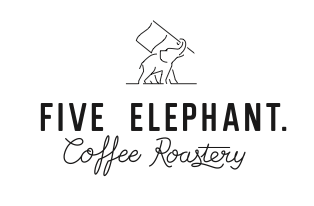This week we return to Berlin with one of our favourite roasters, Five Elephant. They’ve got a beautiful Kenyan AA, bursting with orange marmalade goodness, stewed fruits, and a bunch of white grape — or a whole lot of Ribena and apple juice concentrate if you give our brew method a try 😉
You can sign up to receive other rare, unique, and special coffees just like this when you join our Superlatives subscription, or just purchase a one-off bag.
About the coffee:
Variety: SL 34, SL 28, Ruiru 11
Harvest: December 2017
Process: Washed
Drying: Raised Beds
Farm location and characteristics:
Country: Kenya
Producers: Gitwe Farmers Cooperative Society
Farm: 600 Gitwe Smallholder Farmers
Region: Gatundu, Thika District, Central Province
Altitude: 1880 masl
We’re so excited to have Five Elephant back with a stunning sophomore effort. Asking them to return to showcase this stunning Kenyan was always a no-brainer. Here’s some extra info below on the farm where this coffee was produced, along with a bit about Five Elephant, and a crispy brew guide where you can try out something a little different.
The farm:
Gitwe Farmers Cooperative Society is a group of smallholder coffee farmers. Individually they may have only a small amount of coffee to sell, ranging from just a few bags, but collectively (there are 600 smallholder farmers in this co-op) they make up a considerable economic unit. As a unit, the Gitwe Farmers co-op sells the coffee on behalf of the smallholders. In Kenya, this is democratically operated organisation, run and organised by the farm producers, who are also members.
Part of the economics with co-ops also extends to the shared use of washing factories. Karatu Coffee Factory is one of these wash stations affiliated with the Gitwe Farmers Cooperative Society. Located in Gatundu South, this factory was established in 1965 on an 11-acre piece of land, serving nine different co-ops around the area.
Collaborative Coffee Source have a really in-depth article about Gitwe Farmers Cooperative Society and the Karatu Factory here.
About the roaster:
Five Elephant is a specialty coffee roastery, bakery and cafe in Berlin, Germany. They have the requisite passion for quality that perhaps separates specialty coffee from commodity coffee. But their passion is matched with a desire to source coffees in a way that’s mindful of their environmental influence and social impact within the producing communities. This can mean hard decisions made in the short term, but ones that enable fruitful, transparent, and sustainable relationships with farmers over a longer period.
We sat down with Kris from Five Elephant last year in May, and his interview with us still makes for some fascinating reading.
https://www.baristahustle.com/blogs/subscription/superlatives-five-elephant
The water:
It’s a slightly different recipe we used for this coffee, highlighting the marmalade juiciness of this coffee along with the stewed fruits, upping the buffer ratio a little and the minerals in general. Head here to make the concentrates for this Five Elephant water recipe:
- 62.5g Buffer
- 30.5g Mg
- 907g DI water
The brew guide:
After listening to our very own Jeremy, here at BH, never stop talking about cezve coffee — we finally let him make a brew guide for one.
Jem’s Cezve-Wendelhoff Recipe
- Brew Ratio: 12g:100g
- Temperature: Start temp 20°C, End temp 94°C
- Contact time: 3 Minutes
- Grind Setting: 1.0 on the EK43
Method
Add the grinds and water into the cezve and whisk the grinds into a cold emulsion for around 20 seconds. Place the cezve onto a hob and monitor the temperature. Use a high heat setting. Note: if you have a traditional copper cezve, it won’t work on an induction hob. Alternatively, you can use a gas burner or a sand heater.
Some temperature probes can go a little haywire in the cezve environment, especially when bubbles begin to form. As an insurance policy, so long as you remove the contents of the brew from the cezve before it boils over, you will get a decent brew. Even though the coffee appears to be boiling, the average slurry temperature won’t reach 100°C. For best results with an accurate probe, wait until the slurry passes 90°C to remove the cezve. This will take around 90 seconds with an induction hob set to 240°C.
Just before the coffee overflows or your reading reports 94°C (whatever happens first) transfer the contents of the cezve into a V60 loaded with a pre-rinsed filter paper — you may call this process ‘polishing’ but its proper name is the Wendelhoff. You can choose to arrest the drawdown at a fixed time e.g. around 60 seconds but this is not absolutely necessary. The remainder of the brew usually tastes great too, you will just achieve a half a percent higher extraction if you wait a little longer.
This brew method is surprisingly resistant to flavours of over-extraction and delivers a silky espresso like mouthfeel and a very long finish. The Five Elephant Karatu AA at 3.5% strength had a mouthfeel of apple juice concentrate with lots of the classic Ribena quality we associate with the best Kenyans.
Watch the video below to see how it’s done!
Let us know how you go in the comments below!
The Barista Hustle Superlatives subscription is a monthly delivery of beautiful, special, and interesting coffees from roasters and farms all over the world.
We package up the coffee into small 70-100g bags (depending on cost, rarity, and supply) and send it to 800+ subscribers in over 40 countries.
No shipping costs, just delicious coffee every month, straight to your letterbox.
Order yourself a bag here (if available still!) or sign up for the subscription.
Learn about past Superlatives here.
